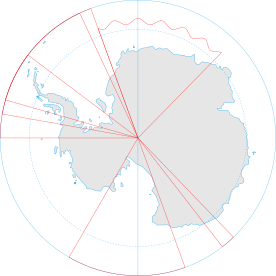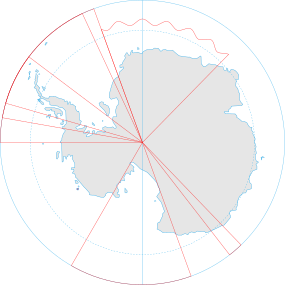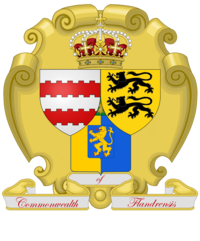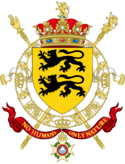Flandrensisian Commonwealth
This article or section contains out-of-date information or information about an entity that is currently undergoing major changes. |
Flandrensisian Commonwealth | |||||||||||||||||||
|---|---|---|---|---|---|---|---|---|---|---|---|---|---|---|---|---|---|---|---|
|
Flag | |||||||||||||||||||
 | |||||||||||||||||||
| Official languages | Dutch | ||||||||||||||||||
| Government | Commonwealth | ||||||||||||||||||
• Secretary-General | Niels of Flandrensis | ||||||||||||||||||
| Legislature | State-General of Flandrensis | ||||||||||||||||||
| Establishment | 24 October 2010 | ||||||||||||||||||
| Time zone | (UTC -8) | ||||||||||||||||||
| |||||||||||||||||||
The Flandrensisian Commonwealth (or Commonwealth of Flandrensis) was founded on October 24, 2010 and was an intergovernmental organisation between a two Belgian and two Dutch micronations. The Commonwealth was disbanded on April 30, 2016. The only member that's still active is the Grand Duchy of Flandrensis.
History
The history of the Commonwealth start with the foundation of the Grand Duchy of Flandrensis on September 4, 2008. Because micronationalism isn’t well-known in Belgium or the Netherlands Flandrensis was a unique project. Inspired by Flandrensis two citizens of started also their own micronation: the Principality of Arkel (2009) and the Kingdom of Albion (2010). Arkel was first a vassal of Flandrensis, but with a form of autonomy. Albion was a full sovereign micronation but had good relations with Flandrensis. As small nations Arkel and Albion were faced with institutional problems so it was difficult to develop their nation alone.
On September 26, 2010 the head of state of the Kingdom of Albion send an e-mail to the Grand Duke Niels of Flandrensis with the request if the Kingdom of Albion may become a vassal, just like Arkel. The status of a vassal would allow Albion to made use of all Flandrensisian institutions, until Albion would be strong and developed enough. Immediately started the discussion to form a Commonwealth. There were several factors that indicate a likelihood of success. In the past Flandrensis helped to build the Principality of Arkel and the Kingdom of Albion, and both head of states are citizens of Flandrensis. Moreover, all three micronations speak Dutch and are members of the Antarctic Micronational Union.
On October 24, 2010 the Flandrensis Commonwealth - also known as the Commonwealth of Flandrensis - was founded. Instead of the status of vassal Flandrensis allowed Arkel and Albion to be sovereign nations and gave the access to all Flandrensisian institutions to develop their own. Because their intense corporation they create an intergovernmental organization with a lot of influence in the Dutch-speaking sector and in the Antarctic micronational community. On January 7, 2012 the Kingdom of Albion left the Commonwealth and was disbanded. But a month later in February 2012 the then Grand Principality of Campinia - a Belgian micronation - joined the Commonwealth.
On April 30, 2016 the Grand Duke of Flandrensis decided to dissolve the Commonwealth: “One of the main goals of the Commonwealth was to promote micronationalism in Belgium and the Netherlands. After 8 years existence we didn’t succeed to enlarge the Dutch-speaking micronational community, meanwhile the Anglophone and Hispanic are very huge and there is a very big development in the Francophone community! But establishing micronationalism in our region is not anymore a priority. Flandrensis is a worldwide community and our focus is now on the ecological story”.
According the treaty of Ghent, the Grand Duchy of Flandrensis considers itself as the legal successor of the Commonwealth, its islands and territorial waters.
Members of the Commonwealth
Goal of the Commonwealth
The goal of the Commonwealth is to develop Dutch-speaking micronationalism by corporation between its members. The Principality of Arkel and the Duchy of Campinia will follow the States-General of Flandrensis and Constitution for:
Foreign affairs
Each member can make treaties with other nations without the interfering of the commonwealth. But Albion, Arkel and Flandrensis always act for the common good of the commonwealth. If a micronation recognize a member, they also have to recognize the other members and the Commonwealth of Flandrensis as well. By working together the members of the Commonwealth speak with one voice in the micronational community.
Defense
The Principality of Arkel, the Duchy of Campinia and the Grand Duchy of Flandrensis are all members of the Union Against Micronational War. Because their pacifistic policy and awarded by several micronational awards the Commonwealth and its members are well-known and respected in the micronational community. Although the Commonwealth is against any form of micronational warfare (illegal internet activities, infiltrations, vandalism, etc.) all members help each other in case of problems. On April 16, 2011 they published an official document declaring internal neutrality in all micronational conflicts.
Economy
All companies as newspapers, radio or others are recognized in both micronations and are available for all the citizens of the Commonwealth.
Civil rights
All citizens of the Principality of Arkel, the Duchy of Campinia and the Grand Duchy of Flandrensis are equal and have the same civil rights.
All members of the Commonwealth behold their full sovereignty and are not part of the Grand Duchy of Flandrensis. In case of governmental disputes Arkel has always the right to use their veto. But the members recognize Flandrensis as the leading nation in the Commonwealth.
Structure
The activities of the Commonwealth are carried out through a multilateral assembly consisting of the States-General of the Grand Duchy of Flandrensis and the representatives of the Principality of Arkel. The official head of the Commonwealth is Niels of Flandrensis, also known as Secretary-General of the Flandrensisian Commonwealth. Prince Maarten of Arkel and Prince Guillaume II of Campinia are Vice-Secretaries.
Territory

 Grand Duchy of Flandrensis
Grand Duchy of Flandrensis
- Siple Island
- Pranke Island
- Maher Island
- Cherry Island
- Carney Island
 Principality of Arkel
Principality of Arkel
- Dean Island
- Ross Ice Shelf
 Duchy of Campinia
Duchy of Campinia
- Vollmer Island
- Moody Island

